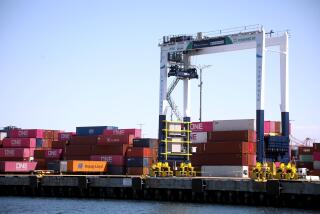Energy Dept. to Tighten Nuclear Labs’ Security
- Share via
WASHINGTON — The U.S. Department of Energy unveiled a sweeping overhaul of its security programs Tuesday amid mounting charges in Congress that it has ignored Chinese espionage and other major weaknesses at the nation’s nuclear weapons laboratories for years.
Energy officials said they hope the new restrictions on everything from computers to foreign visitors to the labs will not only plug leaks of classified information and technology, but will fend off critics in Congress and the Clinton adminstration who argue that the labs should be removed from Energy Department control.
Energy Secretary Bill Richardson also said that the University of California, which has managed two of the three nuclear weapons labs since 1943, will not be granted an automatic extension when its current $25-million annual contract expires in 2002.
“Unless there are overriding circumstances, we’ll put everything up for bid,” Richardson said. An aide said the UC contracts have never been competitively bid.
Under the contracts, last extended in 1997, the UC regents are responsible for managing the Los Alamos National Laboratory near Sante Fe, N.M., and the Lawrence Livermore National Laboratory southeast of San Francisco.
UC also is the prime contractor at the DOE’s Lawrence Berkeley National Laboratory, an energy research center near the UC Berkeley campus. The third major weapons lab, the Sandia National Laboratory in Albuquerque, is managed under a competitively bid contract with Lockheed Martin Corp.
UC spokesman Rick Malaspina said the not-for-profit contracts with the DOE are used to cover administration of the labs’ $2.5-billion annual budgets, bookkeeping and other management costs. He said about half the money is returned to the labs for discretionary research.
Congressional critics have cited sloppy lab management as one of many areas of concern in a department that has resisted reform for years despite repeated losses of classified data, sensitive technology and government property.
Victor S. Rezendes, a director at the General Accounting Office, the investigative arm of Congress, complained to a House Commerce subcommittee on April 20 that the UC contracts “have outlasted all secretaries of Energy” since the department was founded.
Rezendes said DOE “managers and contractors have shown little attention or priority to security matters.” He also cited “a serious lack of accountability at DOE. Efforts to address security problems have languished for years.”
Richardson said President Clinton supported his reform package, which he said seeks to correct “long-standing problems,” improve oversight at the weapons labs and protect America’s nuclear secrets.
“It’s an acknowledgment that there’s been a lack of responsibility and accountability, and we’re trying to do something about it,” he said, adding that the reforms also acknowledge “that security in the past has been treated as a low priority.”
The reorganization calls for the creation of a new position to oversee all security-related functions, from guards to computers, at the department.
“I’m going to call that person the czar,” Richardson said. He said he hoped to find a former four-star general or other senior military officer to take the job.
Richardson said he also would ask Congress for an additional $50 million over the next two fiscal years to increase computer security at the labs through firewalls limiting unauthorized outside access to computers, checks of e-mail and other means.
The cyber-security plan calls for random audits of computers, and better physical barriers to prevent employees or others from using removable data storage devices or other technology to obtain classified files from secure areas.
“We’re placing controls on people so they can’t walk out with disks,” Richardson said.
The FBI is investigating a former Los Alamos nuclear weapons computer scientist, Wen Ho Lee, for possible espionage on behalf of China through the computer system.
Lee electronically transferred massive program and data files on generations of nuclear weapons from a classified system at Los Alamos into an insecure office network between 1983 and 1995, officials have said. The FBI has not found evidence to show that Lee provided the top-secret material to anyone else, but says it cannot rule out the possibility.
Other parts of the department’s overhaul include the following:
* A new office will be created to better track and account for all plutonium, uranium and other special nuclear material as it is transferred or stored in the DOE system.
* A new office will be established to track and analyze all visits and assignments to the labs involving foreign nationals. Richardson said he opposed efforts in Congress to stop foreign visits outright.
* The FBI will take over investigations for top-secret security clearances at the labs, which are required for work in the nuclear weapons divisions.
* Implementation of a “zero tolerance security policy” will strengthen penalties for security infractions within the labs.
* The department will beef up counterintelligence efforts, notably by speeding up investigations into the backgrounds of lab personnel. A special vulnerability assessment group called the “Red Team” will be established to evaluate espionage threats and to test the security system.
* Clinton will extend by 18 months the review of Energy Department documents more than 25 years old that were to be automatically declassified in April 2000 to ensure that no still-secret nuclear weapons data are mistakenly released.
More to Read
Sign up for Essential California
The most important California stories and recommendations in your inbox every morning.
You may occasionally receive promotional content from the Los Angeles Times.











